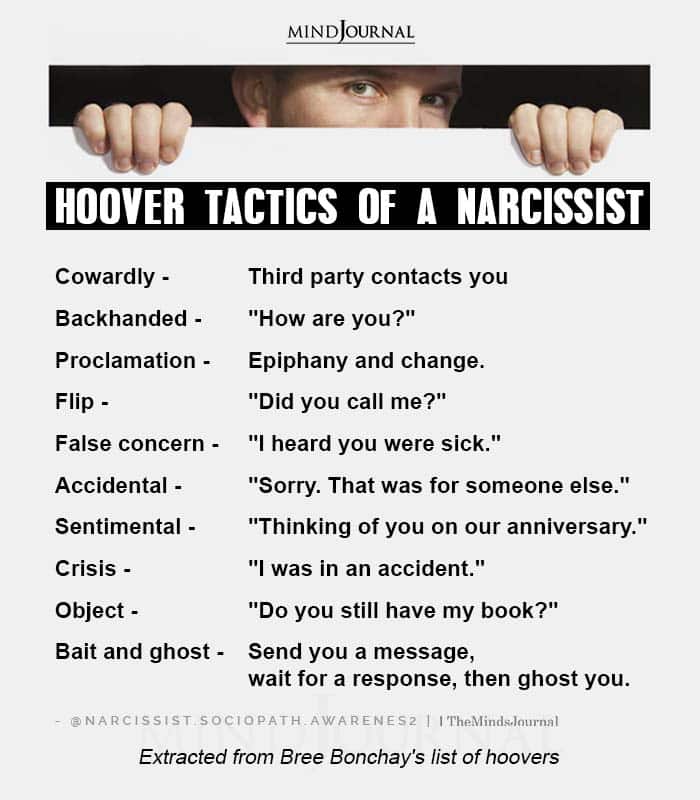Have you ever experienced hoovering by a narcissist? This post is going to explore in detail what is hoovering in emotional abuse and the relationship between hoovering and emotional abuse.
If you’re researching this topic, you’re probably in one of two positions:
- You’re a victim of this emotionally abusive tactic
- Someone is accusing you of hoovering
Either way, this post will cover everything you need to know about hoovering.
Related: The Ten Types of Victims the Narcissist Hoovers
So, what is hoovering in emotional abuse?
If you’ve heard the term “hoovering” in a conversation about a romantic relationship, you should know that the term is very closely associated with emotional abuse.
Hoovering is the act of bringing a person back into a relationship after you’ve discarded them. Like a Hoover vacuum, your ex sucks you back into the relationship.
But you should also know that hoovering doesn’t necessarily equate to emotional abuse. You could be dealing with someone who genuinely realizes their mistake and wants you back. Or you could be dealing with a narcissist.
This post will cover the ins and outs of hoovering and how to tell if it’s part of a darker emotionally abusive pattern.

Hoovering and the on-again-off-again relationship
Whenever I hear that someone is in an on-again-off-again relationship, my next question is this:
Who’s the narcissist?
It’s possible to have this kind of back-and-forth with two semi-healthy individuals, but it’s unlikely.
And when you learn about emotional abuse in a romantic relationship with a narcissist, you’ll understand my question.
Many (but certainly not all) relationships with a narcissist follow a distinct pattern of abuse. It happens in three stages that repeat again and again until someone puts an end to it.
1. Love Bombing
In this stage, a narcissist or other emotionally abusive person will do everything they can to impress their target. They’ll instantly become the person the target has always wanted, and they’ll work hard to win him or her over.
This is similar to a typical “honeymoon phase,” but it’s more intense. There are some red flags, but if you’re a good target, you’re going to overlook them. If you’re a poor target, the narcissist will move on.
Related: What Is Hoovering? How Does a Narcissist Reel You Back In?
2. Devaluing
Once the target is “on the hook,” the narcissist or other abusive person begins the devaluation stage. It will likely start with subtle put-downs. It might be so subtle that you wouldn’t recognize it as abuse. But then it continues and gets worse.
Since it happens gradually, you may not suspect emotional abuse. You just know this person makes you feel bad sometimes. There may even be some triangulation (read this post to learn what that is). Depending on your situation, devaluing may remain subtle or it may escalate.
3. Discarding
Not all narcissists and emotional abusers will discard their partners, but many do. And if you’re here to learn about hoovering, you’ve either discarded or been discarded. This is when the abuser ends the relationship, and it’s often very cold and brutal.
If you’ve been discarded by a narcissist, you might feel like you’ve had the rug pulled out from under you.
Here, you thought you shared something special, but somehow, it’s as if your partner moved on instantly without a care in the world. And if you’re dealing with a narcissist, it’s because they actually did move on without a care in the world.

4. Hoovering
Again, not all narcissists hoover. And even among narcissists with a strong history of hoovering, they won’t hoover every target. But the narcissist who discarded will almost definitely come back to you if you’ve been a good source of attention for them.
If you weren’t -or if you saw through their game- they’ll likely move on to the next target. It’s hard to believe when you’re in it, but this isn’t personal. It’s the furthest thing from it, actually.
And once you’ve been hoovered, you can expect the cycle to repeat itself again. There will be some level of love bombing in the beginning. It may even come with an apology but don’t get used to that. It won’t be long before this person is devaluing you and blaming you for everything again.
And the cycle repeats…
This is an on-again, off-again relationship. And that’s why I always wonder which one is the narcissist when I hear about this type of pattern.
Related: Trapped in the Narcissist’s Web: 8 Signs You Are Being Targeted by a Hoovering Narcissist
How to know when hoovering is abusive?
As I mentioned earlier, hoovering isn’t always part of an abusive pattern. If you’ve had an otherwise happy relationship with a break and the other person wants you back, there’s no need to get suspicious.
But if the pattern repeats and this person is hoovering a second time… run. They may not be a narcissist, but this is a major sign that they are emotionally unstable.
You can also look at the pattern I described above to get a feel for whether this relationship is healthy or abusive. If you can relate to the stages above, it’s not a good sign.
If you’re in a romantic relationship that is abusive in any way, consider ending it or taking a break. At the very least, you will benefit from some alone time where you can focus on self-love.
I’ve been in this place myself, and I can honestly say that the best gift you can give yourself is space from this person. Time and space will help you evaluate whether things are healthy or not.
If you are in an abusive relationship there’s something called a trauma bond that will keep you going back — even though you know it’s crazy. This is why space is the only answer.
Written By Common Ego
Originally Appeared On Common Ego










Leave a Reply